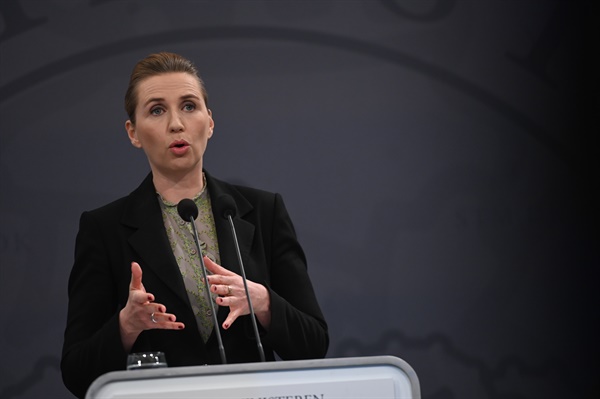큰사진보기

|
| ▲ DENMARK PANDEMIC CORONAVIRUS COVID-19 Denmarkapos;s Prime Minister Mette Frederiksen during a press briefing on COVID-19 in the State Department in Copenhagen, Denmark, 6 April 2020. Countries around the world are taking increased measures to stem the widespread of the SARS-CoV-2 coronavirus which causes the Covid-19 disease.
|
| ⓒ EPA/Philip Davali | 관련사진보기 |
Denmark was this week the first European country to announce a gradual reopening of society, and for the Danish government the first step will be to reopen primary schools and kindergartens.
The plan to reopen the schools after the Easter holiday on April 15th was presented by Prime Minister Mette Frederiksen at a press conference on April 6th. But not all parents are thrilled about letting their children back to school, and soon after the press conference, Sara Andersen, a mother of two, created a Facebook group with the title "
My children are not going to be lab-rats for COVID-19" as a protest. The protest group grew rapidly and after just three days there were more than 33.00 members in the group sharing posts with their concerns about the plan to reopen the schools.
The Facebook group was started by Sara Andersen, a mother of two girls aged 5 and 9. In an interview with the Danish newspaper Politiken she explains, that she felt shocked when she heard the news of the primary schools being the first place to reopen. Up until this point Sara Andersen has been a firm supporter of the government's strategy for fighting corona, but the plan to reopen kindergartens and primary schools as the first step out of the corona lockdown is according to Sara Andersen a huge mistake:
"I get the feeling that the children will be lab rats in a big social experiment, because there are so many things we don't know about this virus. It is crazy to start the reopening with the small children, because many of them are too small to understand the guidelines for protection", she said to the newspaper, and refers to a concern that is shared by many in the Facebook group:
"How can small children be expected to keep a distance of two meters and to remember to sneeze in the elbow?"
Sara Andersen created the Facebook group Monday night at 21.30 and in less than 24 hours the group gathered more than 20.000 followers. Facebook protest groups are not uncommon in Denmark, but the large number of supporters in a short time made the media and politicians pay attention. In a press conference the following day the Director General of the Danish Health Authority publicly responded to the claims made by the Facebook group:
"Reopening primary schools and kindergartens is not a social experiment, and we are not using children and teachers as lab rats. I want to oppose this comparison very, very strongly."
Denmark, with a population of 5,5 million, was one of the first European countries to lockdown and has 5.635 confirmed corona cases and 237 deaths. The lockdown in Denmark has successfully softened the curve in time to avoid a breakdown in the health system as seen in countries like Italy and Spain. With a careful and gradual reopening of the society the government aims to keep the corona cases within the capacity of the health system while easing the strains put on the economy by allowing more people to resume to work instead of having to take care of their children at home.
The government is making big efforts assuring parents, that several health regulations will be put in place, and that no schools will reopen until they meet all these regulations. School principals are struggling to find a way to ensure measures like two meters distance between students in the classroom and access to regular handwashing every two hours.
According to the Danish health authorities, the decision to allow small children back to school as the first step, is based on the fact that children are much less likely than adults to get ill with coronavirus.
In Denmark 1.924 children up to 9 years have been tested for corona, and only 1,8 percent of these children have been tested positive with Covid-19. This is much than the number for the rest of the Danish population where 9,9% of the persons tested have been positive.
Many parents are however still worried. Even if children are less likely to get ill from corona, there is still the risk that the children can carry the virus home, where they can infect their parents and relatives. Many suggest that a better way to gradually reopen the society would be to allow restaurants and hairdressers to reopen, but according to the government's plan, these places will remain closed.
The controversy in Denmark will soon be seen in other countries around the world. Which is a better way to help the economy while trying to keep the coronavirus under control? The day after Denmark announced it's plans for schools reopening Norway followed with a similar plan. Austria on the other hand has presented a plan, where smalls shops restaurants will reopen first while schools in Austria will remain closed.